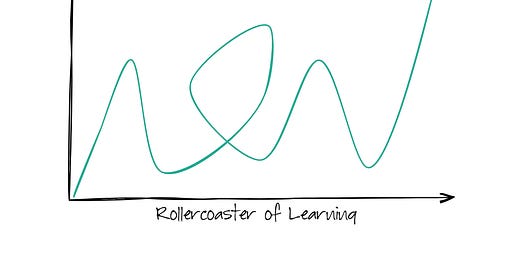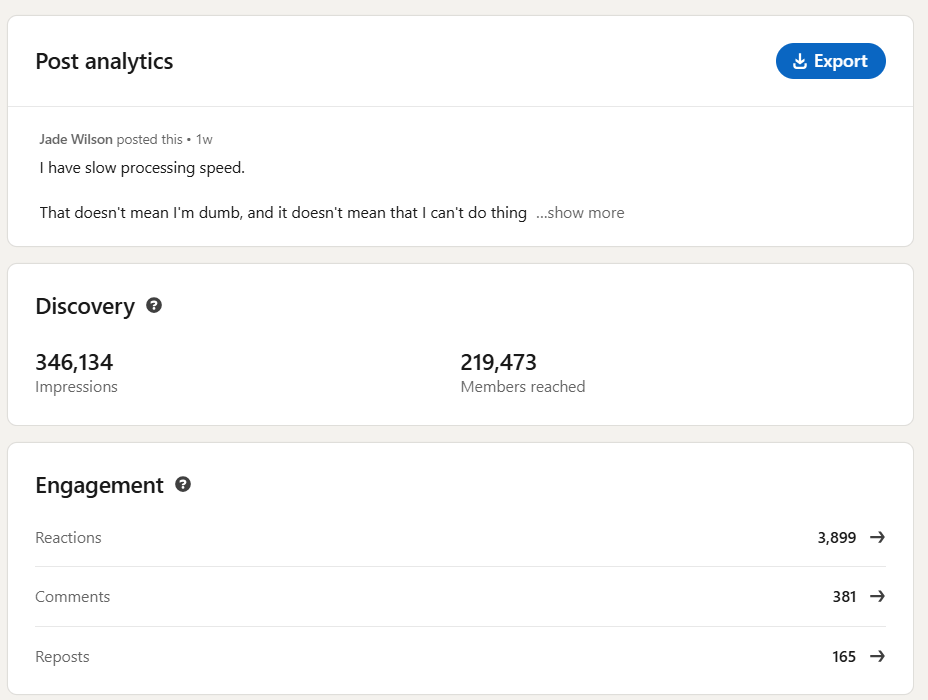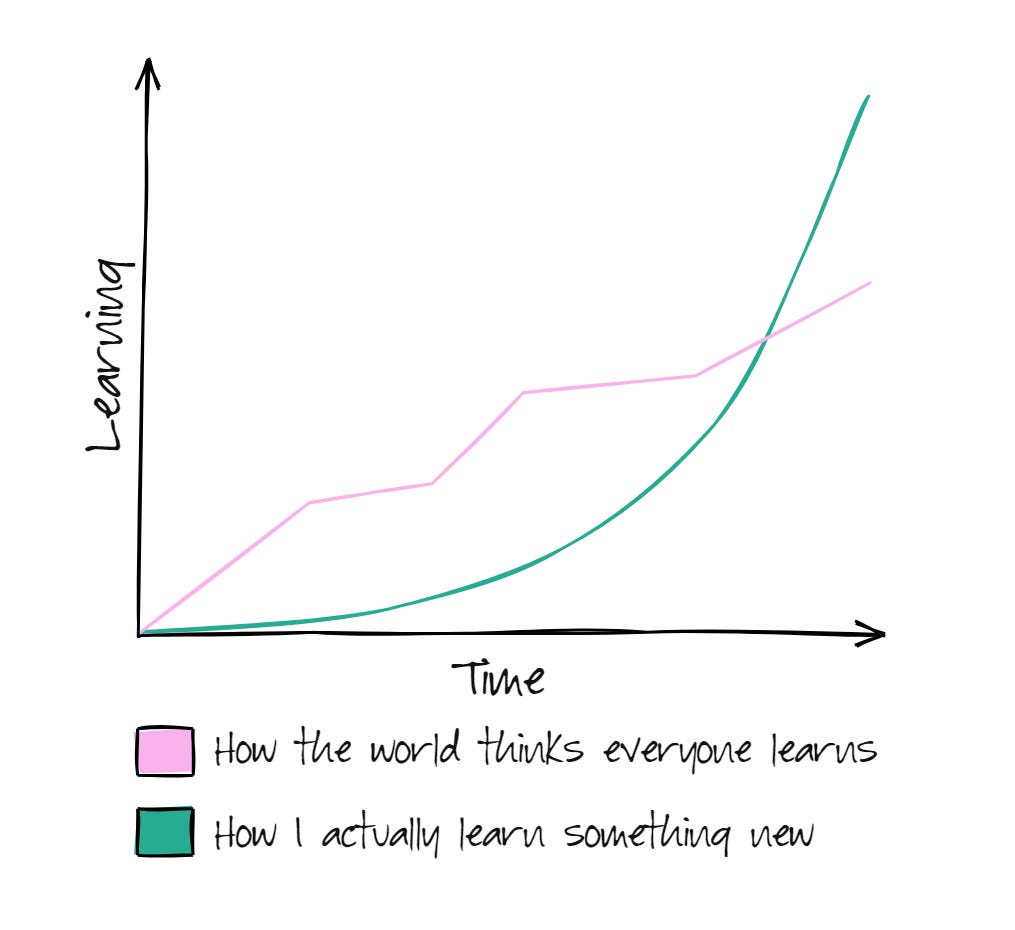Slow and Steady Wins the Race
Today, I want to talk about the stigma around slow processing speed and neurodiversity and the challenges this creates with traditional systems.
A few days ago, I posted on LinkedIn about something deeply personal, something I had been hesitant to speak about for a while.
I have slow processing speed.
The response was overwhelming. The post resonated with so many people, garnering thousands of reactions, hundreds of comments, and hundreds of thousands of impressions…
And I realised I wasn’t alone.
In fact, let me show you! Here’s a brief summary of the post analytics:
I was truly blown away by the love and support, and also by how many people felt the exact same way.
What Slow Processing Means for Me
Slow processing speed has been a lifelong challenge. If I’m asked about something unfamiliar or put on the spot without context, I take longer to process the information than most people. But once I do? I grasp it deeply.
On top of this, my ADHD adds another layer:
Verbal instructions? Hard to retain.
Large blocks of text? Overwhelming.
Memorisation-heavy learning? A struggle.
Being diagnosed with ASD and ADHD set me on a journey of self-discovery. That journey didn’t just help me understand myself… It gave me the confidence to advocate for others experiencing the same struggles.
And that’s why I’m writing this today.
A Slow Start… A Sudden Leap
Looking back, the signs were always there.
In primary school, English was a real struggle for me. I needed extra lessons and private tutoring just to grasp the basics. I vividly remember my tutor trying to explain the difference between to, two, and too or their, there, and they’re, and no matter how hard I tried, I just couldn’t get it.
Until one day, it just clicked.
And that became a pattern in my learning. I would struggle immensely at first, feeling like I was falling behind, until suddenly, everything would make sense, and I would excel beyond expectations.
By Year 6, I was able to do some GCSE-level Maths (four-five years ahead of my year group). Everything seemed to be falling into place.
But the cycle continued.
The Shift in Secondary School
In my first year of secondary school, things moved slowly for me again. I was placed in the second set for Maths, still a great placement, but not the top. Halfway through the year, I switched schools due to bullying, and I was placed in the second set again.
I was doing okay, but not excelling.
Then, towards the end of the year, something changed:
My teachers noticed my potential.
After an exam review, they asked if I wanted to move to the top set.
I said yes.
And suddenly, I was flying.
I went from predicted C grades to predicted A*-A grades.
I was very fortunate. I managed to excel in Maths, English, and Science, often scoring 90-100% in Maths exams, even at the A-Level stage. In all honesty, I was a bit of brat… I didn’t study, was disruptive in lessons and I barely did homework unless it counted towards my grade. Instead, I relied on my ability to recognise patterns.
If I understood the fundamental principles and patterns, I could figure everything else out.
That method worked brilliantly in school/college, but university introduced challenges I wasn’t prepared for.
A System Not Built for Me
University was a different beast.
I moved to a new city, alone, and made no friends in the first three months. I chose to study Maths because I was good at it, but suddenly, the content didn’t click.
I was truly humbled.
My ability to recognise patterns wasn’t enough anymore. I was expected to memorise terms, formulas, and concepts that weren’t intuitive to me.
I was diagnosed with severe depression and anxiety.
I started skipping lectures. Falling behind. Doubting myself.
Eventually, I switched to Computer Science, which reignited my love for learning. It was all about logic, problem-solving, and patterns.
In my first year, I thrived. I enjoyed the coursework, and I finished with a First.
Then Years 2 and 3 hit me like a ton of bricks… Again.
Reading was exhausting. I had to re-read paragraphs five or six times before they made sense. I watched my peers grasp concepts instantly, while I felt lost.
At one point during a group project, I broke down, convinced I wasn’t smart enough.
Searching For Answers
I felt that something was wrong, I started to be convinced I had dyslexia or dyspraxia. Hoping for answers, I got tested through the university.
The results? Not what I expected.
I was told that:
I didn’t have dyslexia or dyspraxia
I did score highly in visual-spatial reasoning, visual perception, and pattern recognition (shocker)
I had slow-processing memory when it came to hearing and reading words and sentences.
If I applied for it, I could get additional time in exams (I didn’t do that, I really struggled with taking care of myself).
But at least it helped me understand myself a bit more.
It was the first time I felt like it was okay that I needed to work a bit harder to understand something initially.
The self-awareness it brought has proved crucial throughout my career.
A Rollercoaster of Learning and Confidence
The same pattern followed me into my career.
At first, every new job felt like an uphill battle. The systems were complex, the workflows unfamiliar. I felt dumb. It was like a rollercoaster…
I’d struggle, then suddenly understand, then struggle again, and then it would click… Repeat.
And then something weird happened. I started getting really good.
Suddenly, I could dive into a codebase, make sense of it quickly, and add value within a week. The fundamentals were clear, the patterns recognisable.
I realised my slow processing wasn’t a negative, it was finding things other’s weren’t.
Where others grasped things quickly, I spotted gaps.
Where others moved fast, I calculated carefully.
At first, I thought I just “wasn’t getting it”… but over time, I saw that the gaps I noticed were real gaps, things others had overlooked.
And I found that I excelled at breaking down requirements, structuring them into clear, iterative chunks, that helped others see the gaps, that I saw, too.
What once felt like an endless cycle of doubt turned into something I never expected… Momentum. Which has lead to some pretty quick promotions:
APD → Product Owner → Lead Product Owner (after 12 months)
Tappit → Senior Software Engineer → Lead Engineer (after 6 months)
Microsoft → Software Engineer II → Senior Software Engineer (after 13 months, plus 5 months maternity leave)
Despite my struggles, I was excelling.
But looking back, I see a bigger pattern, the system wasn’t built for people like me.
The Hidden Challenges of Slow Processing
Living with slow processing speed doesn’t just affect how I learn… It affects how people perceive me.
People lose patience with me.
When someone explains a new concept, I often need a moment to fully absorb it. But instead of waiting, they assume I don’t understand at all… Or worse, that I’m not paying attention… Which can also sometimes happen when I’m given too much information in one go, but not because I don’t want to listen, but because it’s overwhelming.Colleagues have got frustrated.
In fast-paced discussions, people expect me to grasp new ideas instantly. If I ask for clarification, they sometimes respond with:
❌ “But I already explained this.”
❌ “It’s obvious.”
❌ “Never mind, I’ll just do it myself.”Written exams were a nightmare.
Timed exams never measured my intelligence, they measured my speed. No matter how well I understood the content, I often ran out of time before I could finish. And when I rushed, I made mistakes.Interviewers expect instant answers.
Many technical interviews reward speed over thoughtfulness. When I’m asked a complex question, I need a moment to think and process. But instead of waiting, some interviewers assume:
❌ “They don’t know the answer.”
❌ “They’re not technical enough.”
❌ “They’re struggling.”
In reality? I wasn’t struggling… I just needed time to process it in the way I absorb information.
But in a world that values fast responses over deep thinking, slow processing speed is often mistaken for incompetence.
What Needs to Change?
Throughout my life, I’ve struggled, not because I lacked ability, but because the systems around me weren’t designed for different ways of thinking.
I truly believe that we need to do better in three key areas:
1️⃣ Education – Schools can accommodate different learning styles. Instead of forcing memorisation-heavy methods, we can adopt more flexible learning approaches that support students who process information differently.
2️⃣ Workplace Support – Many workplaces still operate under outdated assumptions about how people learn and work best. Employers need to recognise that brilliance doesn’t always look like instant recall. Some of the best problem-solvers take time to process, then deliver incredible insights.
3️⃣ Hiring Practices – Many technical interviews favour fast recall over deep thinking. We need more inclusive hiring that values problem-solving ability over memorisation. Employers are passing on top talent who do not fit the traditional mould.
💡 I’ll be diving deeper into each of these topics in future posts!
Accepting Differences in Tech
Slow processing speed isn’t incompetence. It’s a different way of thinking.
Once I process information, I excel in the right environment.
Many brilliant minds work this same way.
By having cognitive diversity, we build stronger teams.
I’m incredibly fortunate to have had supportive teachers and workplaces that helped me grow into the person I am today. But I also recognise that many people in similar or worse situations haven’t had that support.
They feel like they don’t fit in because they struggle.
And if you’ve ever felt like you process things differently, know this: you’re not alone, and you belong here.
🎤Join the Conversation
Have you ever struggled with traditional interview processes? Do you have ideas on how companies can improve? Please discuss in the comments!







This is a great post, and I can really relate to you, Jade. Might be also good video material actually!
I had different kinds of issues, but in the end, the outcome was the same - I had to find my own patch through the mess tbh.
Highly relate to this feeling, Jade. I've always been terrible in interviews because of this, and honestly never realized why, but your explanation helps me understand why and that I'm not alone. Thanks for sharing about this and would be great to chat about it more soon when we meet up in Gdansk!